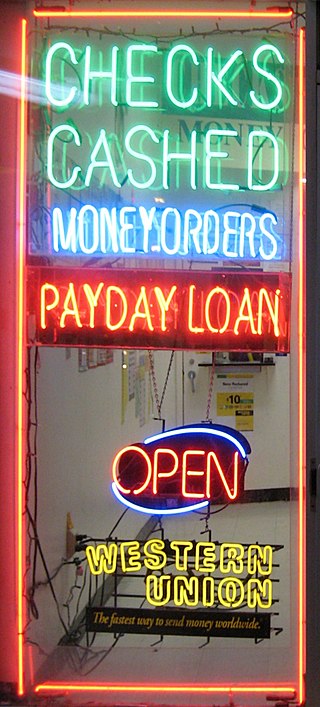
A debit card, also known as a check card or bank card, is a payment card that can be used in place of cash to make purchases. The card usually consists of the bank's name, a card number, the cardholder's name, and an expiration date, on either the front or the back. Many new cards now have a chip on them, which allows people to use their card by touch (contactless), or by inserting the card and keying in a PIN as with swiping the magnetic stripe. Debit cards are similar to a credit card, but the money for the purchase must be in the cardholder's bank account at the time of the purchase and is immediately transferred directly from that account to the merchant's account to pay for the purchase.

EMV is a payment method based on a technical standard for smart payment cards and for payment terminals and automated teller machines which can accept them. EMV stands for "Europay, Mastercard, and Visa", the three companies that created the standard.
Bank fraud is the use of potentially illegal means to obtain money, assets, or other property owned or held by a financial institution, or to obtain money from depositors by fraudulently posing as a bank or other financial institution. In many instances, bank fraud is a criminal offence.

A payday loan is a short-term unsecured loan, often characterized by high interest rates. These loans are typically designed to cover immediate financial needs and are intended to be repaid on the borrower's next payday.

Credit card debt results when a client of a credit card company purchases an item or service through the card system. Debt grows through the accrual of interest and penalties when the consumer fails to repay the company for the money they have spent.
A credit history is a record of a borrower's responsible repayment of debts. A credit report is a record of the borrower's credit history from a number of sources, including banks, credit card companies, collection agencies, and governments. A borrower's credit score is the result of a mathematical algorithm applied to a credit report and other sources of information to predict future delinquency.
An e-commerce payment system facilitates the acceptance of electronic payment for offline transfer, also known as a subcomponent of electronic data interchange (EDI), e-commerce payment systems have become increasingly popular due to the widespread use of the internet-based shopping and banking.
Providian Financial Corporation was an American financial services company founded in 1997, which became one of the leading credit card issuers in the United States before it was sold to Washington Mutual for approximately US$6.5 billion in October 2005. The company emphasized borrowers with lower income and lower credit ratings. Providian was headquartered in San Francisco, California, and had more than 10 million card holders at the time of its sale. Washington Mutual, Inc., continued to run the company as a wholly owned subsidiary, out of its San Francisco headquarters. At its peak, the company employed approximately 13,000 people nationwide. Providian had significant operations in California, New Hampshire, and Texas.
A merchant account is a type of bank account that allows a seller, known as the merchant, to accept payments by debit or credit cards. A merchant account is established under an agreement between an acceptor and a merchant acquiring bank for the settlement of payment card transactions. In some cases a payment processor, payment service provider, independent sales organization (ISO), or member service provider (MSP) is also a party to the merchant agreement and can act as middle man between the merchant and the bank.

Payment cards are part of a payment system issued by financial institutions, such as a bank, to a customer that enables its owner to access the funds in the customer's designated bank accounts, or through a credit account and make payments by electronic transfer with a payment terminal and access automated teller machines (ATMs). Such cards are known by a variety of names, including bank cards, ATM cards, client cards, key cards or cash cards.
Advanta was an American banking company. It controlled two banks, Advanta Bank Corp and Advanta National Bank.
NetBank, formerly named Atlanta Internet Bank (1996) and Net.B@nk (1998), was an American direct bank that operated between 1996 and 2007. Netbank suffered from bank failure and was closed by regulators on September 28, 2007.

The Green Dot Corporation is an American financial technology and bank holding company headquartered in Austin, Texas. It is the world's largest prepaid debit card company by market capitalization. Green Dot is also a payment platform company and is the technology platform used by Apple Cash, Uber, and Intuit. The company was founded in 1999 by Steve Streit as a prepaid debit card for teenagers to shop online. In 2001, the company pivoted to serving the "unbanked" and "underbanked" communities. In 2010, Green Dot Corporation went public with a valuation of $2 billion. Since its inception, Green Dot has acquired a number of companies in the mobile, financial, and tax industries including Loopt, AccountNow, AchieveCard, UniRush Financial Services, and Santa Barbara Tax Products Group.
Internet fraud prevention is the act of stopping various types of internet fraud. Due to the many different ways of committing fraud over the Internet, such as stolen credit cards, identity theft, phishing, and chargebacks, users of the Internet, including online merchants, financial institutions and consumers who make online purchases, must make sure to avoid or minimize the risk of falling prey to such scams.

Credit card fraud is an inclusive term for fraud committed using a payment card, such as a credit card or debit card. The purpose may be to obtain goods or services or to make payment to another account, which is controlled by a criminal. The Payment Card Industry Data Security Standard is the data security standard created to help financial institutions process card payments securely and reduce card fraud.

A credit card is a payment card, usually issued by a bank, allowing its users to purchase goods or services, or withdraw cash, on credit. Using the card thus accrues debt that has to be repaid later. Credit cards are one of the most widely used forms of payment across the world.

A bank is a financial institution that accepts deposits from the public and creates a demand deposit while simultaneously making loans, mobilising saver surplus to deficit spenders. Lending activities can be directly performed by the bank or indirectly through capital markets.
A payment processor is a system that enables financial transactions, commonly employed by a merchant, to handle transactions with customers from various channels such as credit cards and debit cards or bank accounts. They are usually broken down into two types: front-end and back-end.
Operation Choke Point was an initiative of the United States Department of Justice beginning in 2013 which investigated banks in the United States and the business they did with firearm dealers, payday lenders, and other companies that, while operating legally, were said to be at a high risk for fraud and money laundering.

Chime Financial, Inc. is a San Francisco–based financial technology company that provides fee-free mobile banking services through two national banks, Stride Bank and The Bancorp Bank.









